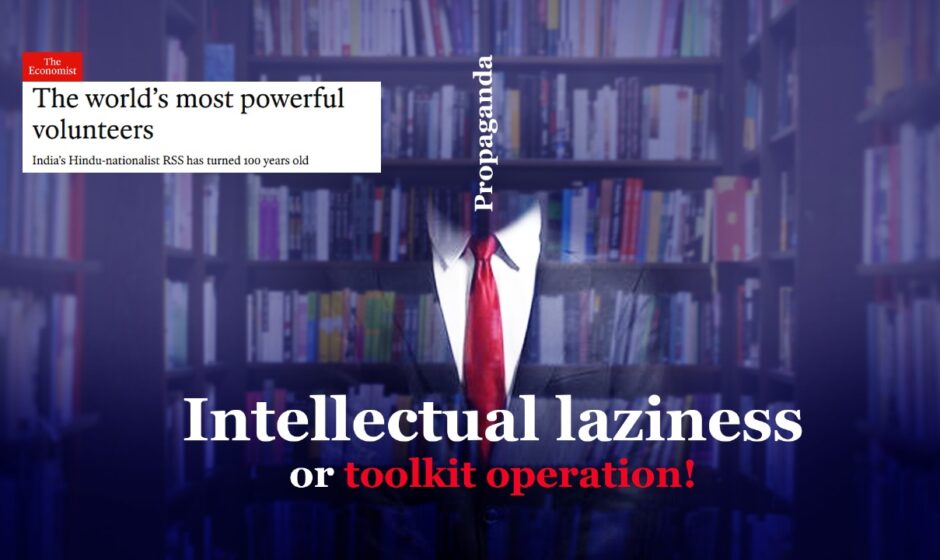The Economist’ stands exposed in its agenda driven write up on RSS, world’s largest volunteers driven Hindu centric movement.
Dr Aniket Pingley
The Economist, in its edition dated September 11, 2025, has published a leader write up on Rashtriya Swayamsevak Sangh (RSS), also known as Sangh. It postures as serious analysis. In reality, it is a flimsy collage of clichés, innuendo and context-stripped assertions.

The author has not studied RSS; he or she has merely parroted decades-old propaganda, hoping that repetition will substitute for rigour. This is not journalism; it is intellectual laziness with an agenda.
I have been trained in rigorous research within scientific disciplines which means I test every claim against data, logic, intention and approach. Unlike the author, I will not shoot and scoot with unverified slogans. I will hold up each statement, examine it under evidence and reasoning and expose whether it stands or collapses. Let’s begin.
The overarching theme of this article is this – a mere lazy recycling of tropes. The author serves up familiar accusations as though they were fresh insight. In truth, it is the same stale dish of “paramilitary,” “fascist,” “second-class citizens,” and “paranoia” — merely reheated and presented as new.
These labels have been thrown at the Sangh for past several decades, none have stood the test of law or fact and yet they are recycled here again. Instead of examining how RSS sustains 83,000 shakhas or runs 150,000 service projects (as stated by the author), the author prefers easier route of re-serving leftovers from decades past.
Before we move ahead, let me unmask toolkit used by the author, like most other authors who are critical of the Sangh. The author uses eleven manipulative devices:
- Stereotype recycling – repeats clichés about fascism and paramilitary roots without fresh evidence.
- Selective history / cherry-picking – cite bans on RSS but conceals that each was revoked after thorough probe.
- Loaded language – uses words like “paranoia” and “obsession” to scare readers.
- Guilt by association – drags in European fascists to taint RSS by proximity.
- Erasure of scale and diversity – mentions RSS size and projects but brushes them off.
- Presenting belief as fact – declares Muslims “second-class” without definition or data.
- One-dimensional framing – reduces RSS to BJP’s campaign arm, ignoring its social work.
- Fear projection – paints RSS as close to authoritarian takeover without proof.
- Tokenism in balance – nods at charity or pragmatism, then immediately dismisses them.
- Echo chamber writing – recycles decades-old Western critiques without new research.
- Context-stripping – omits clarifications (e.g., caste census) to frame pragmatism as hypocrisy.
This toolkit is not one of scholarship but one of manipulation.
Let us now examine how this blunted toolkit is used to criticize the Sangh. For ease of reading, I have used a table for presentation. The list is not exhaustive; however, it should serve the purpose.
| Criticism in Article | Toolkit Trick Used | Facts | Queries |
| RSS wants Hindu-first India, minorities as second-class | Stereotype recycling + loaded language | Minorities hold top constitutional offices; Muslims vote, run businesses, thrive in arts and sport. Socio-economic progression of Muslims is an undeniable fact | If minorities are “second-class,” by what metric? Where is the data? |
| RSS ideology violates secular constitution | One-dimensional framing | RSS never sought a theocracy; it speaks of cultural nationalism. BJP once endorsed “positive secularism.” | If RSS violated the Constitution, why has no court ever said so in 100 years? |
| RSS has paramilitary/fascist roots | Guilt by association + stereotype recycling | No armed wing, no dictator, no fascist-style state control. Built around shakhas, service, volunteerism. | If early rhetoric mattered, why is there no continuity of fascist traits today? |
| RSS was banned thrice | Cherry-picking | 1948 ban lifted after courts did not find RSS’s role in Mahatma Gandhi’s assassination; 1975 was outright Emergency suppression; 1992 ban struck down by court. | If truly dangerous, why revoke every ban? Why not ban permanently? |
| Muslims as second-class | Shoot-and-scoot | Muslims enjoy constitutional equality, socio-economic welfare schemes, political representation at every level. | What does “second-class” mean? Denied vote? Barred from office? Where is evidence? |
| Babri demolition / Ayodhya | Innuendo | CBI court acquitted all accused; temple built via Supreme Court judgment after a long, patient waiting by the entire nation. | Why omit the court verdict? Why keep innuendo alive after acquittal? Why omit that the nation celebrated the construction of the temple on a grand scale. |
| RSS paranoia/obsession | Loaded language | 150,000+ service projects in education, health, relief; 83,000+ daily shakhas build discipline. | Is this paranoia? Is community service equal to obsession? Where’s the proof? |
| Authoritarian discipline = fascism | Trope recycling | RSS decisions by consensus; organizations inspired have disagreed on issues publicly. | If authoritarian, why do these organisations openly disagree with BJP policies? |
| Hindutva dominates all politics | Fear projection + alarmism | Opposition still governs major states; BJP loses elections; multiple visions compete. | If Hindutva dominates, why do opposition parties win a significant chunk of votes across all states? |
I would like to highlight the author’s intellectual laziness furthermore by unmasking baselessness of his statements. Here are a few:
Quote 1: “Senior members have distanced themselves from some of their predecessors’ rhetoric (not least the stuff about fascists).”
- Toolkit Trick: Guilt by association.
- Question: Did a few stray rhetorics from the past shape RSS institutions, seva projects or its consensus-driven culture? If not, why exhume it now? Because the goal is to smear with shadows, not analyse in reality.
Quote 2: “Earlier this year, Mr Bhagwat backed a popular call for India to carry out a caste census, even though the RSS… had long opposed this.”
- Toolkit Trick: Context-stripping.
- Question: Why omit RSS spokesperson Sunil Ambekar’s statement that Sangh was not opposed to caste census for uplift of disadvantaged communities?
- He clearly stated that Sangh was opposed to using caste data for political purposes or bringing about divisiveness in Hindu society,
- Is rational policy adaptation hypocrisy or pragmatism in pursuit of unity?
Quote 3: “The RSS is fuelled both by confidence and paranoia.”
- Toolkit Trick: Loaded language.
- Question: Is running 150,000+ service projects across healthcare, education, rural development paranoia? Is inculcation of daily discipline in shakhas paranoia? Is inculcation of family values or sensitization on environment issues paranoia?
- Or, is paranoia only in author’s imagination? Where is the survey, where is the proof?
Each of these quotes, when stripped of their toolkit tricks, collapses into hollow rhetoric.
Let me now educate the author about the Sangh. Unlike caricature offered, RSS is a cultural, civilizational project of institution-building and service. Here are some of its pillars that enabled 100-year long, thriving journey:
- Cultural nationalism: RSS frames nationalism as civilizational, inclusive and spiritual — not racial, political or state driven. Its prayer seeks unity and well-being for all, not supremacy.
- Grassroots service: With 150,000+ projects in education, healthcare, rural development and disaster relief, swayamsevaks embody seva (selfless service and not paid service) and samanvaya (coordinated efforts). In floods, earthquakes and pandemics, they are first responders.
- Institutional resilience: Decentralised shakhas, volunteer discipline, organic outreach and adaptability are attuned to Bharatiya society’s needs.
- Pragmatism: Balances its philosophical foundations with adaptability, allowing Sangh to evolve with changing realities and openness to correction of aberrations in Indian society if any.
- Self-reliance and rootedness: Emphasises swadeshi ideals, cultural confidence and service to the nation as the highest dharma or righteousness
This is the picture any serious analyst must confront. The Economist’s author chose instead to erase it entirely.
One wonders as to why The Economist allows such a piece under its banner. Where was the editorial rigour? Why publish an article that recycles tropes, omits essential context and reduces complex realities to slogans?
If these are the standards set for its writers by ‘The Economist’, the world’s largest volunteer organisation, then, RSS does not diminish. It is The Economist’s credibility.
RSS has survived hostilities, slander and decades of unwarranted criticism done with an agenda. It continues to grow as it is rooted in Bharatiya society and not on borrowed clichés.
The Economist’s article does not analyse the RSS. It exposes the intellectual bankruptcy of its editorial board and brings to closer scrutiny its rigour for writing.
(Author is an accomplished computer scientist, educator, and holds expertise in media content strategy)


